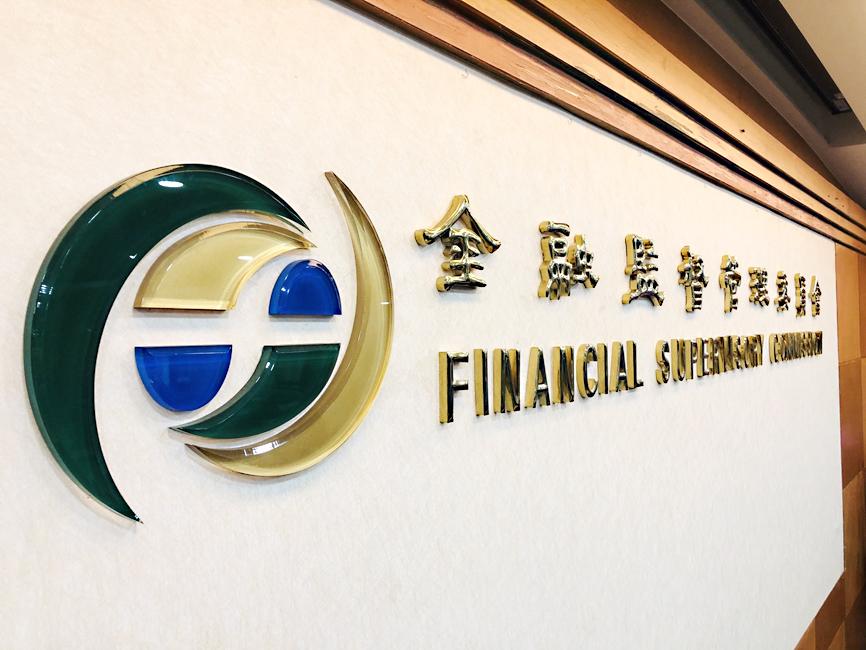The Financial Supervisory Commission (FSC) is to tighten regulations on local financial companies marketing to the elderly, after finding that many banks and insurers last year sold unsuitable products to older customers without a proper risk assessment, the regulator said last week.
The commission plans to implement stricter punishment for financial companies that inappropriately sell products to older customers, and would focus on firms’ marketing activities in its review this year of companies’ treatment of customers, it said.
The FSC is considering asking banks to collect complaints from older customers, and set up databases to systematically review and improve their internal controls and marketing practices, it said.

Photo: Kelson Wang, Taipei Times
The commission might also order the Financial Ombudsman Institution (FOI) to establish a “database of financial exploitation” to collect more data on inappropriate sales to older customers, it added.
The commission last year examined 10 banks, six insurers, six credit unions and three securities companies. It found that some companies sold products to older customers without properly assessing their risk appetite to boost sales, the commission said.
Some exaggerated the returns of products or incorrectly guaranteed profits, while some lured customers to buy investment-linked policies with credit cards so that their internal control department could not review the source of the premium, the commission said.
Some companies categorized older customers as “professional investors,” so that they could sell them complex products such as high-yield bonds or structured notes, even though the practice was not in the customers’ interest, as they would not be able to seek assistance from the FOI in any disputes, because professional investors are not protected by the Financial Consumer Protection Act (金融消費者保護法), the commission said.
The Banking Bureau revised its guidance for local banks last week, requiring them to improve their know-your-customer (KYC) and know-your-product (KYP) practices, it said.
The bureau is to give banks six months to adapt to the new guidance, it added.
The Insurance Bureau is also considering to revise its regulations to improve insurers’ KYC and KYP practices, it said.
The commission has asked banks not to introduce loan programs to older customers over the telephone and insurers to record the whole process of their sales agents selling products to older customers.

SELL-OFF: Investors expect tariff-driven volatility as the local boarse reopens today, while analysts say government support and solid fundamentals would steady sentiment Local investors are bracing for a sharp market downturn today as the nation’s financial markets resume trading following a two-day closure for national holidays before the weekend, with sentiment rattled by US President Donald Trump’s sweeping tariff announcement. Trump’s unveiling of new “reciprocal tariffs” on Wednesday triggered a sell-off in global markets, with the FTSE Taiwan Index Futures — a benchmark for Taiwanese equities traded in Singapore — tumbling 9.2 percent over the past two sessions. Meanwhile, the American depositary receipts (ADRs) of Taiwan Semiconductor Manufacturing Co (TSMC, 台積電), the most heavily weighted stock on the TAIEX, plunged 13.8 percent in

A wave of stop-loss selling and panic selling hit Taiwan's stock market at its opening today, with the weighted index plunging 2,086 points — a drop of more than 9.7 percent — marking the largest intraday point and percentage loss on record. The index bottomed out at 19,212.02, while futures were locked limit-down, with more than 1,000 stocks hitting their daily drop limit. Three heavyweight stocks — Taiwan Semiconductor Manufacturing Co (TSMC, 台積電), Hon Hai Precision Industry Co (Foxconn, 鴻海精密) and MediaTek (聯發科) — hit their limit-down prices as soon as the market opened, falling to NT$848 (US$25.54), NT$138.5 and NT$1,295 respectively. TSMC's

TARIFFS: The global ‘panic atmosphere remains strong,’ and foreign investors have continued to sell their holdings since the start of the year, the Ministry of Finance said The government yesterday authorized the activation of its NT$500 billion (US$15.15 billion) National Stabilization Fund (NSF) to prop up the local stock market after two days of sharp falls in reaction to US President Donald Trump’s new import tariffs. The Ministry of Finance said in a statement after the market close that the steering committee of the fund had been given the go-ahead to intervene in the market to bolster Taiwanese shares in a time of crisis. The fund has been authorized to use its assets “to carry out market stabilization tasks as appropriate to maintain the stability of Taiwan’s

In a small town in Paraguay, a showdown is brewing between traditional producers of yerba mate, a bitter herbal tea popular across South America, and miners of a shinier treasure: gold. A rush for the precious metal is pitting mate growers and indigenous groups against the expanding operations of small-scale miners who, until recently, were their neighbors, not nemeses. “They [the miners] have destroyed everything... The canals, springs, swamps,” said Vidal Britez, president of the Yerba Mate Producers’ Association of the town of Paso Yobai, about 210km east of capital Asuncion. “You can see the pollution from the dead fish.